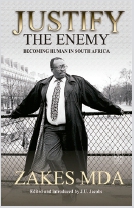Serviços Personalizados
Artigo
Indicadores
Links relacionados
-
 Citado por Google
Citado por Google -
 Similares em Google
Similares em Google
Compartilhar
Literator (Potchefstroom. Online)
versão On-line ISSN 2219-8237
versão impressa ISSN 0258-2279
Literator vol.39 no.1 Mafikeng 2018
http://dx.doi.org/10.4102/lit.v39i1.1519
BOOK REVIEW
Empathy, enemies and present participles: A review of Justify the enemy: Becoming human in South Africa
Sara Thackwray
Private

Author: Zakes Mda
ISBN: 978-1-86914-380-0
Publisher: University of KwaZulu-Natal Press, 2017, R355*
*Book price at time of review
Justify the enemy (2017) is a compilation of the non-fiction writing of Zakes Mda - public lectures, articles, interviews and other compositions - disseminated from 1997 to date. They communicate Mda's concern with narrating all manner of social issues - South African and beyond. These include, amongst others: the role of the past in the present and the way in which it determines the future; environmental stewardship; social development; the dynamic relationship between readers and writers, writers and discourse, and art and politics; landscape as the keeper of memory; the blurred nature of binaries like rural and/or urban, real and/or magic, traditional and/or modern and fact and/or fiction that result in transitive or hybrid identities; and the interrogation of race and culture in post-apartheid South Africa.
The literary quality of Mda's writing substantiates the notion that Mda, as he always insists, is first and foremost a storyteller, even when he is wearing the hat of journalist, social commentator, autobiographer or artist at various times. His writing prioritises immersing the reader in an experience of what it was really like to be in what happened, rather than simply recounting what happened. This is what Mda calls his use of 'voice' (2017:91), and how he distinguishes historians from writers of fiction in his essay, 'Filling the Void'. The variety of topics and genres presented in South Africa and abroad reveal Mda's engagement with a range of ages and cultures, rendering his insights relevant and, for the most part, accessible to a wide audience. Ultimately, however, Justify the enemy is likely to appeal primarily to those of an academic bent.
Amidst the diverse topics of Mda's of writing, it nevertheless remains to summarise some kind of commonality underpinning his collection in order to understand the value that it brings to the literary arena. In this case, it is prudent to use Mda's title, Justify the enemy: Becoming human in South Africa, as a spring board. It derives from an article of the same name by Mda that appeared in the 2008 Boston Review. In it, Mda explains the imperative to recognise the common humanity of even one's enemy, to empathise and seek to understand him as a complex individual and, as such, to justify - at least psychologically, if not morally - his chosen actions. Mda relates this within the prescribed racial context of black versus white during apartheid. However, a broader interpretation of this concept aptly summarises Mda's concern with the colonial, political and social agendas pertaining to race that is present in many of the pieces in this volume. In other words, Mda writes primarily of the need to understand not only the previously predetermined enemy of the white oppressor to which the title refers at its most basic level, but also to understand the myriad forms that this 'enemy' may now take in the post-apartheid setting. It may, at various times, be the short-sighted, poor stewardship described in 'A perspective on global warming', the misguided, manipulative patriotism elucidated in 'Do we need patriotic journalism?', 'Our twin pathologies: Conspicuous consumption and instant gratification', and even 'the new struggle against the enemy of self' (Mda 2017:128) revealed in 'Biko's children'. The challenge is to recover our humanity while contending with the legacy of that noxious apartheid (literally, apart-ness), which maligned that very thing. Herein lies the antidote to these social ills and corrosive prejudices: we should remember our humanity as our primary identity. Mda calls for a movement away from the confines of old, which ultimately bring every issue of identity back to race, towards a more gracious acceptance of our differences, and even shortcomings, in light of our shared human identity. Mda's use of the present participle, 'becoming', denotes the progressive nature of this process, just as articles like 'What it means to be an African: Shifting identities in the South African context' and 'Two steps forward, one step back: Twenty years of freedom' convey this sense of an ongoing process.
Overall, this volume exemplifies Mda's quintessential frankness, which has been received over the years with mixed emotions as critics chastise the 'recklessness' of his revelations and lament his 'disturbing old wounds', while simultaneously praising his writing as 'riveting and daring' (Mda 2017:91-92). To his credit, however, Mda appears to evaluate himself with equal harshness such that he practises the self-awareness and self-criticism he advocates for.
Mda's writing certainly has a thought-provoking advisory role to play in 'mapping a new democracy' (Jacobs in Mda 2017:9), as he addresses the need for popular participation and a 'healthy scepticism' (Mda 2017:194) - the freedom to critique both ourselves and each other in the post-apartheid context without fear of being seen as betraying one's own people (read, racial) group. This, says Mda, is the inroad to uprooting the culture of dependency and entitlement that he believes has set in, and to replace it with the values of self-esteem, self-reliance and self-development.
Reference
Mda, Z., 2017, Justify the enemy: Becoming human in South Africa, University of KwaZulu-Natal Press, Pietermaritzburg.
 Correspondence:
Correspondence:
Sara Thackwray
thackwray.sara@gmail.com














